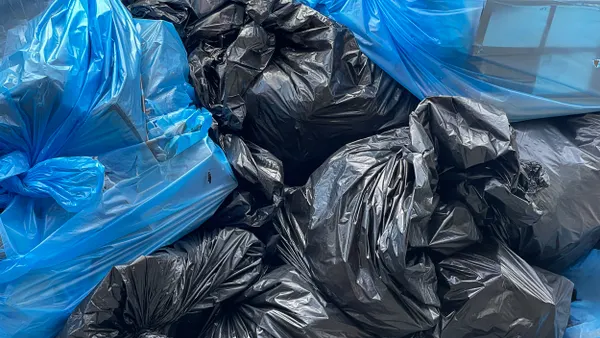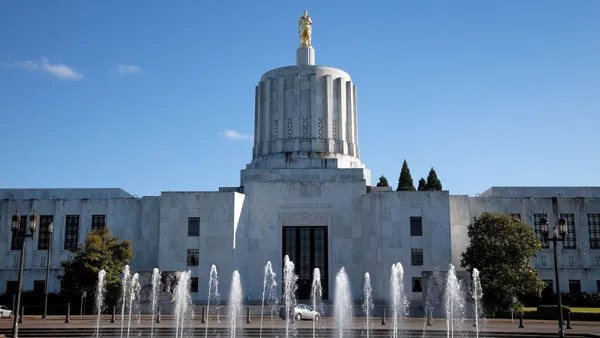Dive Brief:
- A report card from the Environmental League of Massachusetts and six other state environmental organizations gave the Bay State poor grades on just about every aspect of its solid waste policies. The state's Department of Environmental Protection (DEP) has set a goal of reducing waste to 4.55 million tons by 2020 and recently reported a total of 5.51 million tons for 2015. The report card gave the state a D on its reduction efforts and a D- on its tracking of reduction and diversion metrics.
- The state's construction and demolition recycling efforts received an "incomplete" due to lack of comparable data. While the DEP did receive an A for its commercial food waste ban, it received a C for general enforcement of bans on a wider range of materials. The state received a B for its environmental protection efforts related to disposal sites, due largely to recent regulatory restrictions at Casella's Southbridge landfill.
- Recommendations to improve these scores include expanding data collection; implementing mandatory universal recycling and pay-as-you-throw programs, broadening the commercial food waste ban; enacting new waste bans for materials such as mattresses and textiles; and denying approval of an expansion permit for Wheelabrator's ash landfill in the town of Saugus.
Dive Insight:
This is the second annual report card to review environmental policies under Republican Gov. Charlie Baker and the first to include a section on solid waste. The administration was given a C for overall environmental efforts, the same as in 2016. While much of the DEP's waste policy was in place before Baker took office in 2015 the report holds him accountable for not reversing an ongoing decrease in funding and enforcement at the agency.
"The work that they do is triage. They don't have enough staff," said Kirstie Pecci, a senior fellow at the Conservation Law Foundation who wrote the report's solid waste analysis.
Pecci said this affects enforcement and data collection. The presence of additional inspectors in the field could help prevent large quantities of cardboard, metal, glass, yard waste and other items from ending up in landfills or waste-to-energy facilities where they're technically banned by law. This could also help the state resume tracking progress metrics for categories beyond disposal, imports and exports.
Though the state didn't address specific points, it countered the report card's general message.
"The Baker-Polito Administration is committed to ensuring that Massachusetts remains nationally recognized as a leader in combating climate change by securing clean, affordable energy and is pleased our state is on track to successfully reducing greenhouse gas emissions by 2020 through a collaborative approach across state government," wrote Peter Lorenz, communications director for the Executive Office of Energy and Environmental Affairs, in an emailed statement.
The state also touted the disbursement of more than $6 million in recycling grants during Baker's tenure, the $175 million in economic activity created by the 2014 commercial food waste ban and its progress toward the 2020 waste reduction goal. Though as noted in the report that reduction was largely driven by the economic downturn because the state is using a 2008 baseline and waste tonnage is higher than it was in 2010.
In order to achieve Massachusetts' goal of 30% waste reduction by 2020, and eventually 80% reduction by 2050, the environmental community sees a need to do more with the existing waste ban laws. While estimates show regional waste-to-energy capacity to be stable the DEP has projected that the state could be left with only one landfill by 2021 if their reduction target isn't met. Pecci said that getting there may require more municipalities to adopt cost-based reduction programs and more companies to rethink current models.
"The companies that don't change over are trying to make as much money and have as large a profit margin as they can for as long as they can," she said. "If we're looking at the economy the best thing that we can do is put zero waste programs in place."











